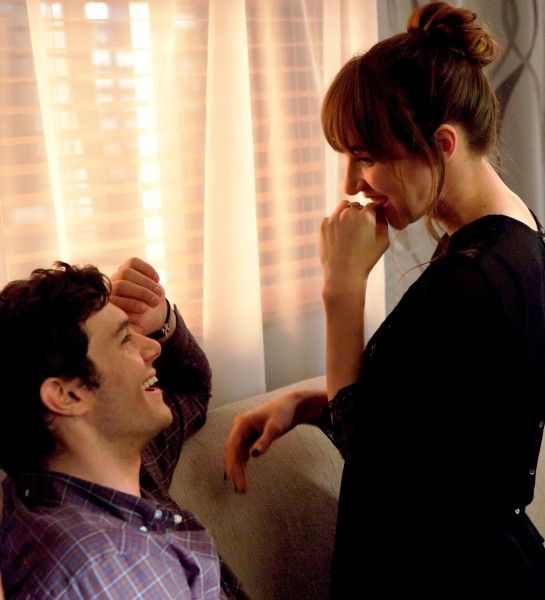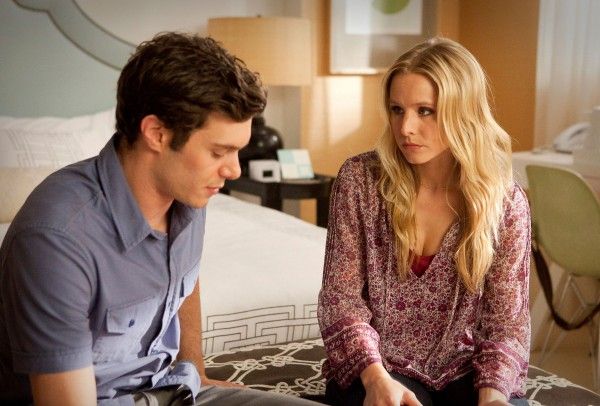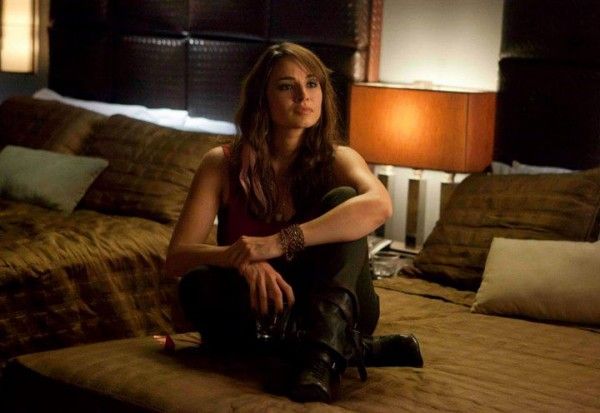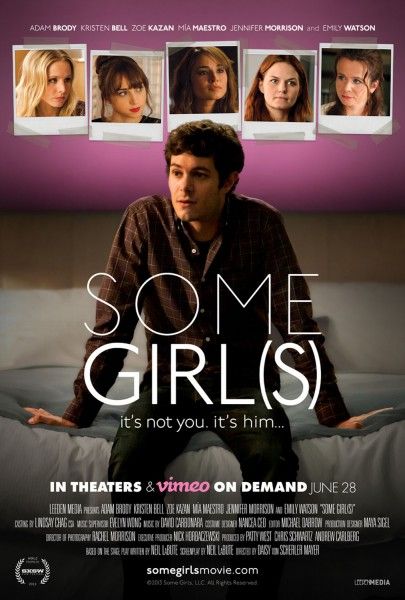Based on the Neil LaBute play by the same name, Some Girl(s) follows a successful writer (Adam Brody) who, on the eve of his wedding, travels across the country to meet up with ex-lovers, in an attempt to make amends for past relationship transgressions. On his journey, he reunites with high school sweetheart Sam (Jennifer Morrison), sexually free-spirited Tyler (Mía Maestro), married college professor Lindsay (Emily Watson), his best friend’s little sister Reggie (Zoe Kazan), and Bobbi (Kristen Bell), who is the one that got away.
At the film’s press day, Adam Brody, Zoe Kazan and director Daisy Von Scherler Mayer spoke to Collider for this exclusive interview about why this project appealed to them, why this play translates well for the big screen, shooting each of the scenes with the women differently to give them each their own feel, what it’s like to work with the words of Neil LaBute, and how the notion of going on a journey to see a bunch of your exes is just so squirm-inducing. Check out what they had to say after the jump.
How did you all come to this project?
ADAM BRODY: I did a short film that Neil wrote, about a year prior. And then, I heard they were doing this, and it was the same people. I definitely wanted to do it. I know I was on some people’s lists, but not as high up on others. I think a few people passed, and then I got a chance.
DAISY VON SCHERLER MAYER: I can’t imagine it without Adam. I think Adam’s casting goes a long way, in the way that you keep rooting for him, even though he says such horrible things. He reminds me a lot of pseudo-sensitive guys that I dated before, thank god, I got married and off the market because that was dreadful. There’s that fake sensitivity that is real, from his point of view. He draws you in. All of [the actors] were offered these roles.
ZOE KAZAN: I think that the opportunity to get to do a very juicy, long scene just doesn’t come around that often. Neil’s writing and the other people involved made it seem like the kind of fun experience you look for. You just don’t get to do acting like that, that often. You come in and do a couple of days work on a movie, but there’s a lot of sitting there and trying to look pretty. But, this required a lot of you. It seemed like a really fun challenge to have to create a whole person, in just a couple days. Scenes this long just don’t exist in movies. Most of the time, a five-page scene is a long scene, and these were 18- or 20-page scenes.
VON SCHERLER MAYER: That’s what made it so fun, from my point of view. We did one day of rehearsal, and then three days of shooting the scene. And for that one day of rehearsal, everybody came in with so much material and so much preparation. It was all about shaping and finessing, and the cinematographer, Rachel Morrison, was with me and we came up with how we were going to shoot it. There was this joy of having people come so ready to play and ready to work and prepared. I remember Zoe saying, “Okay, I don’t want to talk about the kiss. I have an idea for the kiss. It’s not going to be a movie kiss.” I was like, “Go for it!” And it’s the best kiss, ever. After that take, I was like, “That’s it. That’s the kiss. I don’t want to do another.” And then, she was like, “No, we should get a safety.” But I knew, and that’s the one that’s in. That’s the kiss. It was the first kiss because it was messy and fucked up, in the way that the movie is and that relationship is.
Unlike a lot of plays that don’t really translate well to film, this play really seems well suited for that. Why do you think that is?
VON SCHERLER MAYER: Visually, we certainly tried to reduce the cabin fever by mixing up how we were shooting it and where the light was coming from. But, the actors were so well prepared when they came in for rehearsal that we were able to find a lot of movement in the scenes while making it organic to what was going on. They’re genuinely trying to get away from each other, or coming closer together, in a way that I don’t think you feel because it’s organic to Neil’s text. A lot of that, they brought in, having done a lot of preparation. We hit the ground running, in the process.
Had you wanted to shoot each of these scenes differently to give them each their own feel, from the beginning?
VON SCHERLER MAYER: We did. Zoe’s scene, for example, was shot handheld. It’s, by far, the most raw scene. You feel the most off-kilter. And it was intentionally lit pretty bright because there’s an interrogation quality to it, and it has a feeling of revealing and exposing secrets. The Emily Watson scene, for example, is more elegant and it’s on the dolly. It’s more dark and moody and intellectual. All those things came into it, but everything came from the scenes. It was all dictated by the material.
KAZAN: I think it’s also helpful to have different locations. One thing it says in the play script is that all the hotel rooms essentially look alike, which is great for a play because then you don’t have to make big scene changes. So, they made an effort to make all these hotel rooms look really different. He’s on a journey, so there’s natural movement in it. If I were actually doing this in a play, I think I would move around a lot less than you want to for film, to create different angles and use the space and have it not just feel like two people, sitting in a room.
BRODY: I also think that one of the fun things is that, every 15 minutes, it’s infused with a new energy and a new person. It’s exciting, every time it changes and you get a new actor, and it’s not just two people. That said, I also think the writing is really good. Even if it was just two people, the writing has a lot of nice layers, and twists and turns. There’s just good old-fashioned drama in there.
What’s it like to live with the words of Neil LaBute?
BRODY: For me – and I come from zero theater – I feel like, if this wasn’t a play first and someone just wrote this, it would be so much talking for talking’s sake, and it would be so structureless and meandering. Because [Neil LaBute] is such a professional storyteller, playwright and writer, and because this thing has been work-shopped and performed in a lot of different cities, the drama is tight. There’s a pace to it. I just think it works, as well-structured scenes, and it wouldn’t have, had it not had so much time to incubate.
Adam, what was it like to work with these different actresses and get a little beaten up by them, figuratively and literally?
BRODY: It was lovely. The abuse wasn’t that draining. He’s so awful. I don’t think he’s a good guy, at all, and I think he’s incapable of learning. He’s not really after closure, and he’d be incapable of getting it, anyways. But, he’s very vocal about what his intended goals are, or what he thinks they are, and he thinks he’s being honest. It was easy enough to take that line and argue his case and try to believe it. Yeah, getting raked over the coals by some of the actors was tough, but being so insulting was also tough. For me, even though what I did to Zoe’s character is definitely the most awful in the movie, because that was in the past, it wasn’t as hard, in a way, for me to talk about, as it was with the Jennifer Morrison character. I probably did the least harm to her, and yet, because she’s kind of lamb like and open to maybe having some reconciliation and I’m just saying awful things to her, I felt like I was saying the worst things to her. That was the hardest thing, to stomach saying it and trying to be okay with it and putting a positive spin on it. So, it was a little bit of a challenge to say some horrible things with a straight face and the best intentions, and also to be taken to task for that, from some of the actors. But really, that being said, it was more a pleasure than anything. It was really fun to get to do these big scenes with these five fantastic actors. It wasn’t grueling.
Actors talk about how they have to like any character they play, but with a guy like this, did you even try to find justifications for his actions?
BRODY: I don’t want to totally oversimplify it, but it was easy to me, in the sense that the whole movie is his big apology, without actually saying he’s sorry and without really being sorry. To me, he’s being honest enough. Even if he’s deluding himself, he thinks he’s telling the truth. So, I was a lawyer for his case and did my best to believe what he was saying, on the surface. It wasn’t too hard. It is a little yucky, at the end of the day, just ‘cause he is so awful. But to me, that’s a reveal, too. He does a lot of awful things in every scene, and there are a lot of indicators. Ideally, the movie works when he bites you, but then draws you back. It depends on your morals, but to me, the reveal at the total end is that he’s irredeemable and, if this were happening in a vacuum, he would never stop. This will just happen forever and ever and ever and ever and ever. I’ve likened it to a horror movie, in that way.
KAZAN: Maybe I’m just not a very good person, but I don’t think that he’s that bad.
BRODY: Oh, god, I think he’s the worst, especially given that last airplane scene, when he’s on the plane and he’s talking to his fiancée, but he’s looking at the flight attendant, the fact that they ended that scene to show that he’s doing that.
KAZAN: Let me rephrase . . . I don’t think he’s that unusual.
BRODY: This isn’t a discredit to the writing, but by the end of the movie, I find him to be almost more of a metaphor than an actual man. I find it to be a little bit like Patrick Bateman in American Psycho. He is a literary construct because he gets back on that plane and does it again. In any individual case, it’s not unusual. But, we’re in a world now where this can happen 40 more times, and it’s mathematically impossible for this person to once, no matter what happened, truly feel sorry. It’s hard for anyone to really change their character, but I feel like this guy is on a loop.
VON SCHERLER MAYER: I feel like he got some pleasure out of making the women relive their pain, in that sadistic, twisted way.
BRODY: I do, too, in as much as it glorified him and made him feel important. I don’t think he is necessarily a sadist, as much as he is a narcissist.
KAZAN: This is so awful and I’m going to get in so much trouble for saying this, but I have cousins who are a lot littler than me. They’re like 10 years younger than me. So, when they were babies and we’d go to visit – and they were 1 ½-year-old twins – I would leave the room and be like, “I love you! I’m leaving! Goodbye! Goodbye! Goodbye!” And then, I would go and wait outside the door until they cried, and I would go back in and be like, “I’m back! I’m back!” And they would run over and hug me. I would just do that, over and over again, when I was 10 or 11. I feel like that’s a little bit of what he’s doing. He wants the adrenalin rush of the attention. I just think there are a lot of people like this, that are seeking to have a feeling and who want to have an experience. It’s about having an effect on another person. I just don’t think it’s that unusual. I think that people do that. I also do think there is some sort of allegorical element. He is “Man.” He doesn’t have a name. But, it’s a testament to the way that Adam plays it, that he doesn’t feel symbolic or allegorical when you watch it. He feels like a person.
VON SCHERLER MAYER: The thing that distinguishes it from some of Neil’s other work, and really made me excited about it, is that the women get their say, the women get their comeback, and the women get their voice heard. They do in some of his other work, as well, and sometimes they are the twisted person, but I do feel like, in this one, there was a lot of opportunity for us to say how this very relatable type of subtle abuse really affects us and has us in therapy and affects our later relationships. It’s that aspect that Neil was so able to get into the heads of the women, and that’s what makes it so powerful because it feels like we’re getting both.
BRODY: They do get their say. Most of them leave in a better place than when they showed up, but it just washes off his back. It doesn’t even register for him.
Could you imagine any scenario where going on a journey to see a bunch of your exes would turn out well?
BRODY: I think the notion of it is so squirm-inducing. Not to go hash it out, but if you had one person that you’d wronged, or you had one huge thing to atone for, you could write a letter and say, “Look, I realize I completely fucked you over, and I’m so sorry.”
KAZAN: When I think about people that I would want to do that with, I just don’t think it’s ever clean. I always think that there’s a part of you that wants something in return from that, whether it’s forgiveness to make yourself feel better or something more complicated, where you apologize to that person so that they’ll apologize to you.
VON SCHERLER MAYER: Or you just want to get in contact with the person. I think that’s the reality. It’s like Facebook.
KAZAN: I’ve though about getting in touch with an ex sometimes, but then I always think, “What is the purpose of this, really? Is it just to make myself feel worse or better? Do I want to get back in touch with the person I used to be?” It doesn’t really do anything for the other person. Maybe it does, but that’s not the reason you’re doing it, most of the time.
BRODY: So, in general, no. It’s like watching a car accident. It feels so awkward.
KAZAN: The fucked up thing about relationships is that there’s no social contract. There’s a social contract with friendship because it’s like, “This is the way friends are.” But with relationships, all bets are off. It’s that all’s fair in love and war thing. Within the privacy of their relationships, people treat each other in ways they would never treat each other, in a family or in a friendship.
BRODY: I guess so. I think families can be awful, too. This is so obvious, but relationships are the only thing where it’s all or nothing. There’s so much drama and sadness inherent in that. You can either be the closest person to me, or you’ve got to be really far away. There’s no middle ground.
Some Girl(s) opens in theaters and is available on Vimeo On Demand on June 28th.





